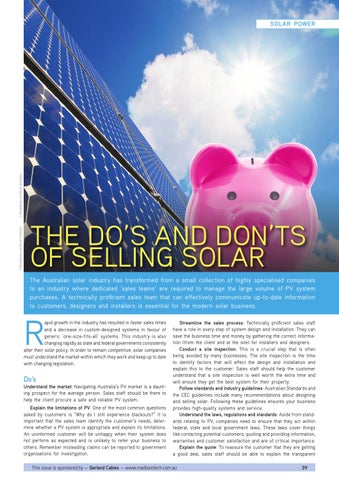© iStockphoto.com/Daniel Schoenen
© iStockphoto.com/Murat Giray Kaya
SOLAR POWER
THE DO’S AND DON’TS OF SELLING SOLAR The Australian solar industry has transformed from a small collection of highly specialised companies to an industry where dedicated ‘sales teams’ are required to manage the large volume of PV system purchases. A technically proficient sales team that can effectively communicate up-to-date information to customers, designers and installers is essential for the modern solar business.
R
apid growth in the industry has resulted in faster sales times and a decrease in custom-designed systems in favour of generic ‘one-size-fits-all’ systems. This industry is also changing rapidly as state and federal governments consistently alter their solar policy. In order to remain competitive, solar companies must understand the market within which they work and keep up to date with changing legislation.
Do’s Understand the market: Navigating Australia’s PV market is a daunting prospect for the average person. Sales staff should be there to help the client procure a safe and reliable PV system. Explain the limitations of PV: One of the most common questions asked by customers is “Why do I still experience blackouts?” It is important that the sales team identify the customer’s needs, determine whether a PV system is appropriate and explain its limitations. An uninformed customer will be unhappy when their system does not perform as expected and is unlikely to refer your business to others. Remember misleading claims can be reported to government organisations for investigation.
Streamline the sales process: Technically proficient sales staff have a role in every step of system design and installation. They can save the business time and money by gathering the correct information (from the client and at the site) for installers and designers. Conduct a site inspection: This is a crucial step that is often being avoided by many businesses. The site inspection is the time to identify factors that will affect the design and installation and explain this to the customer. Sales staff should help the customer understand that a site inspection is well worth the extra time and will ensure they get the best system for their property. Follow standards and industry guidelines: Australian Standards and the CEC guidelines include many recommendations about designing and selling solar. Following these guidelines ensures your business provides high-quality systems and service. Understand the laws, regulations and standards: Aside from standards relating to PV, companies need to ensure that they act within federal, state and local government laws. These laws cover things like contacting potential customers, quoting and providing information, warranties and customer satisfaction and are of critical importance. Explain the quote: To reassure the customer that they are getting a good deal, sales staff should be able to explain the transparent
This issue is sponsored by — Garland Cables — www.madisontech.com.au
39
